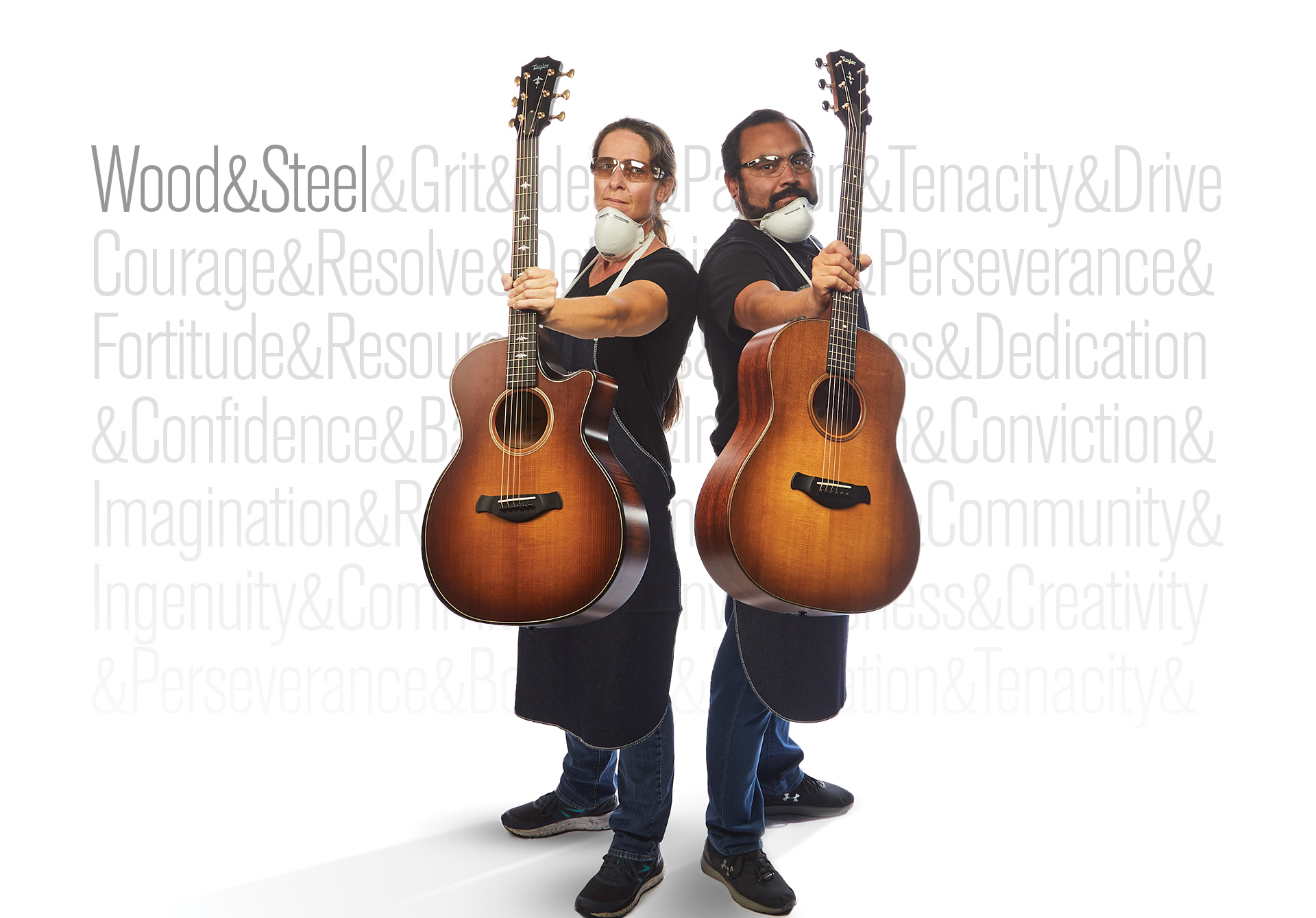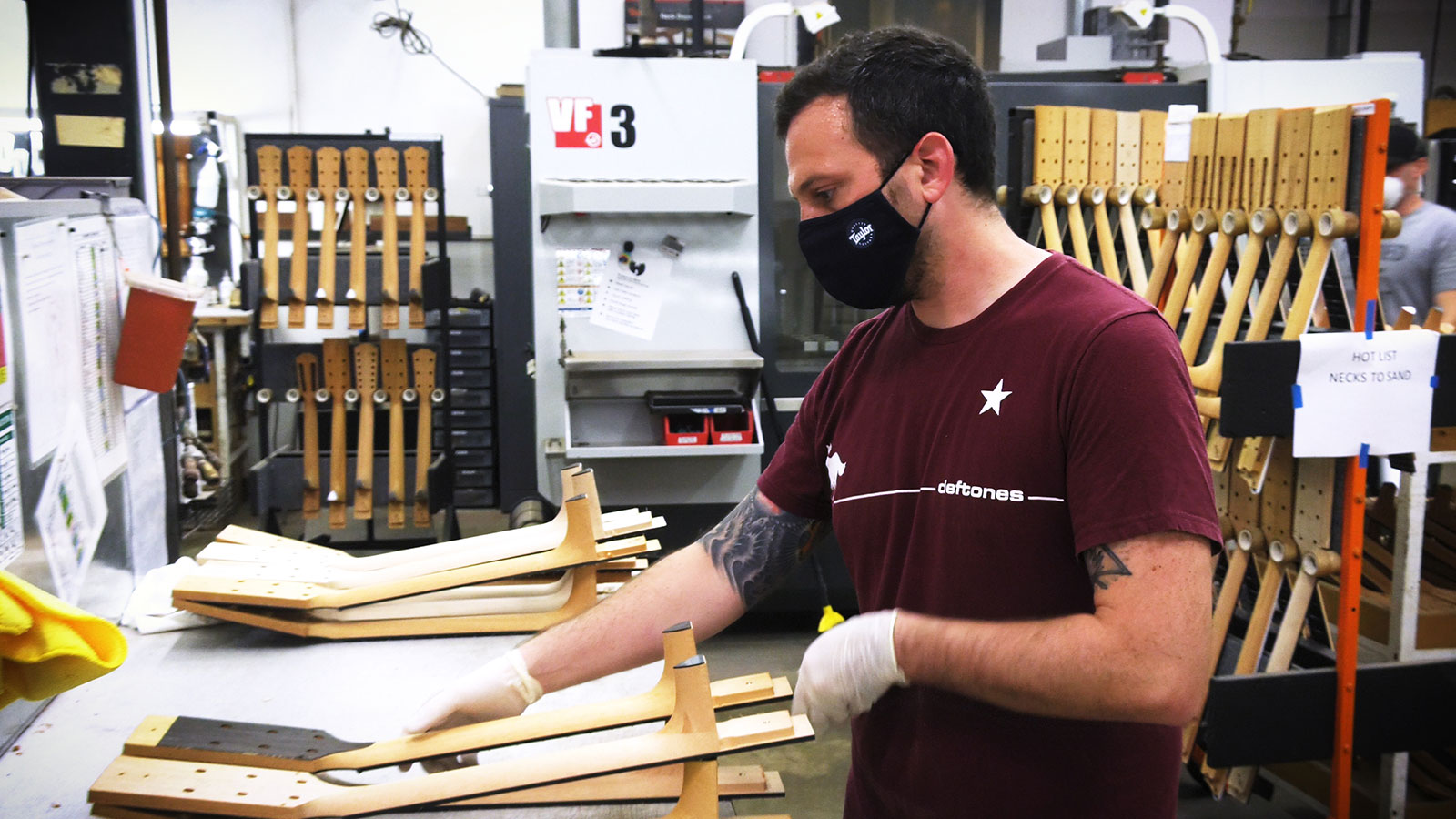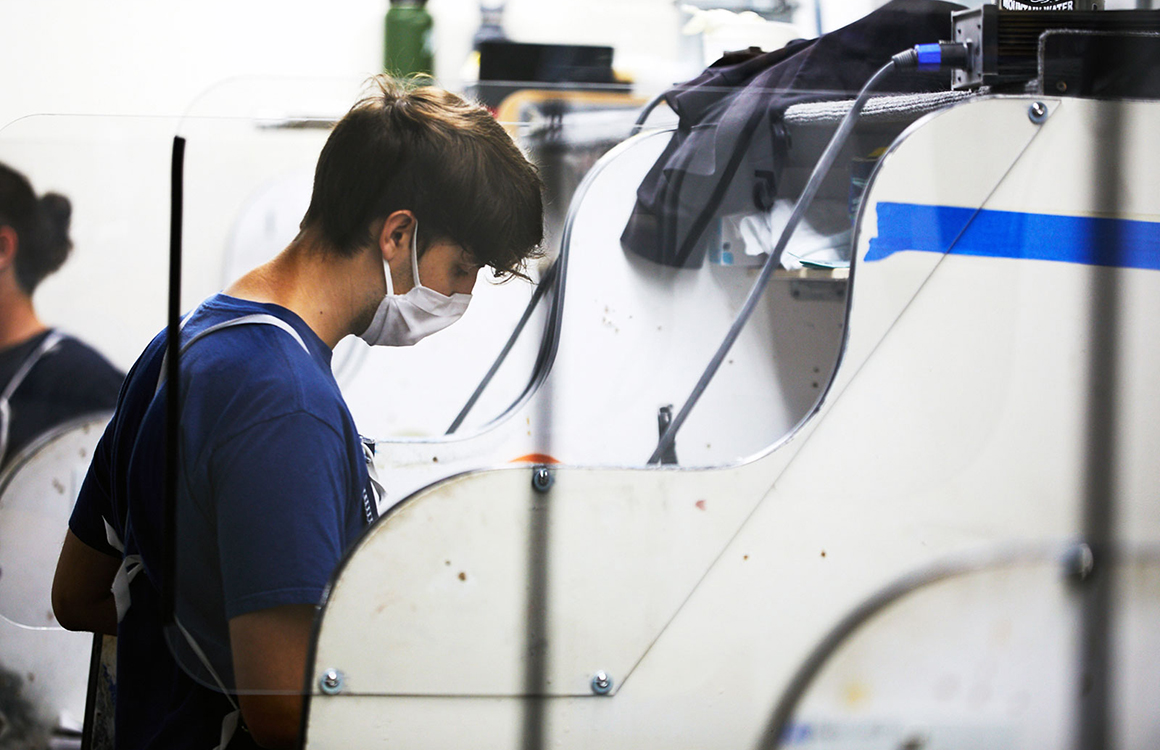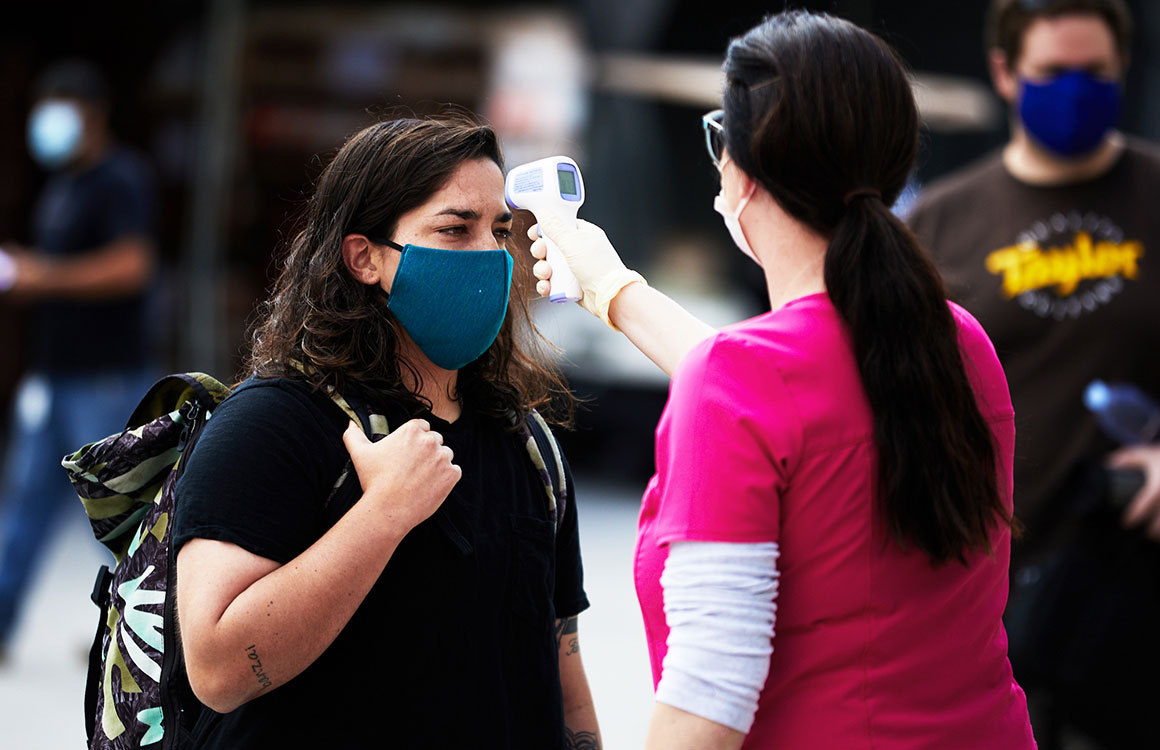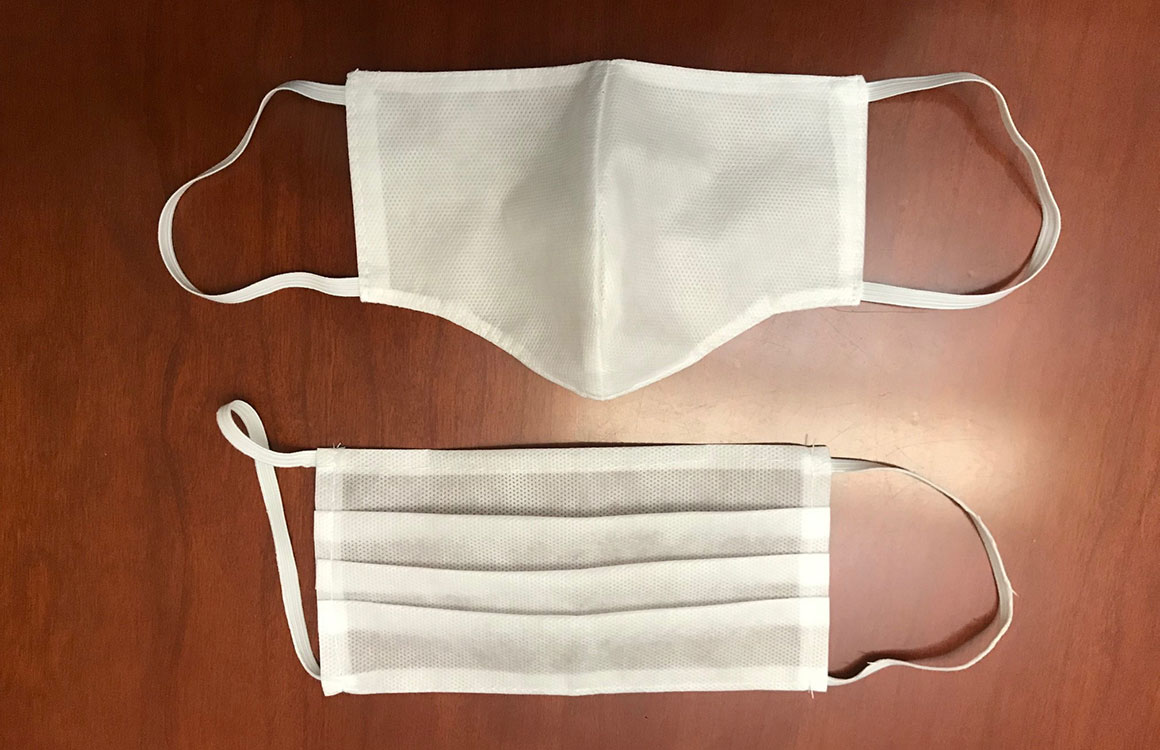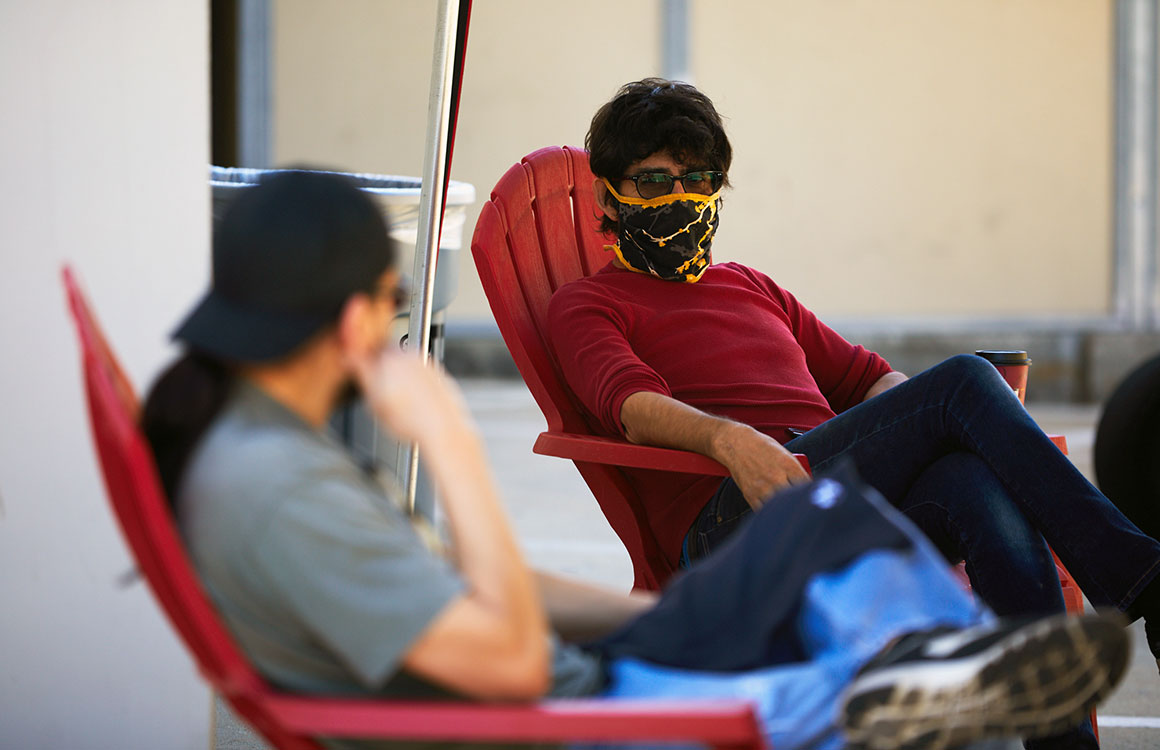Like any seasoned business partners who’ve built their company from the ground up, Taylor co-founders Bob Taylor and Kurt Listug have navigated plenty of choppy waters during their shared 45-year odyssey. “We’ve been through recessions, stock market crashes, oil prices and interest rates going from record highs to record lows,” Kurt says. “There have been wars, a horrendous attack on U.S. soil, and changes in popular music that nearly put guitar companies out of business. But we’ve also experienced a lot of good times and sustained prosperity too.”
After nearly half a century, the takeaways, Kurt and Bob have learned, are that neither the good times nor the bad times last forever, and that the right mix of passion and gritty determination will propel you through the roughest stretches. “When we were a small company and broke, we worked hard and never quit no matter how hopeless it seemed,” he says. “We just put our heads down and kept working, brainstorming, trying. We didn’t have a foundation to build upon. We had to invent everything and look for bright ideas to respond to the marketplace. And we had some real emergencies along the way, where we had one shot to get it right or fail and not survive. That ability to respond to adversity has gotten baked into our DNA as a company.”
The nature of their journey has given Bob and Kurt a profound respect for the working musicians of the world, who travel a parallel path that also demands adaptability and hard-shelled resilience in pursuit of their passion in order to survive. That same sense of kinship also extends to fellow instrument makers and proprietors of independent music shops, and really anyone who has pursued their dream with tenacity. Though Taylor is a larger company now, with a deeper pool of talent and resources at its disposal, master guitar designer Andy Powers, now also an ownership partner, says one of the strengths of Taylor’s culture is that we can still think like a small shop.
“One of the reasons I love working with Bob and Kurt is the way they have maintained that scrappy, fearless mentality of an upstart,” he says. “They’ve built a heritage of working hard through the good days, the mundane days, and the hard ones.” Of course, the juggernaut of the COVID-19 pandemic, with its sweeping global disruption, has introduced a whole different scale of hardship and complexity to navigate. And yet Bob, Kurt, and Andy, together with other Taylor leaders, have again turned to the Taylor playbook in times of adversity: batten down the hatches, get creative, and design solutions that serve the needs of our partners in the music community.
Responding to a New Reality
As a company with global reach, Taylor paid close attention to daily developments abroad as the COVID-19 crisis spread from China to Europe and then to the U.S. earlier this year, creating a rolling wave of business closures and social lockdowns. Taylor’s foremost concern was protecting the health and well-being of employees and their families in the U.S., Mexico, Europe and Cameroon. At the same time, we knew the livelihoods of our dealers and suppliers, along with working musicians, were also at risk. In early March, we began to implement additional health and safety procedures internally, and soon afterward, we suspended factory tours and closed our El Cajon, California campus to the public. On March 19, California governor Gavin Newsom issued a statewide shelter-in-place order, and guitar production in El Cajon was suspended. The Baja California region of Mexico, where our Tecate manufacturing facility is located, was several weeks behind our timeline here in Southern California. On Friday, April 10, the decision was made to suspend all operations there.
Fortunately, Taylor’s executive and management teams had been proactively meeting to plan for a shutdown scenario and the coordination efforts needed to reopen, from helping El Cajon employees participate in the state of California’s Work Sharing Program (which provides companies with a flexible alternative to layoffs) to developing new on-site safety protocols in preparation for the eventual return to guitar production. Taylor also opened a dialogue with officials from the City of El Cajon and San Diego County, ensuring that they were aware of and in support of the steps being planned. As a result, we were able to work smoothly toward a phased approach of reopening critical operations on-site. Meanwhile, we shifted the non-production operations we could to a work-from-home setup, leveraging teleconferencing platforms to meet and collaborate. And we got back to work.
Staying Connected with Customers
Though we had stopped accepting guitars for repair, members of our Customer Service team continued to respond to customers remotely in North America and Europe and were able to adapt smoothly. Given the remote setup, Customer Service Manager Glen Wolff decided the department would work better by primarily using email and chat. “We’d already been doing a lot of communication over email and limited chat, so that was an easy transition when working from home,” Wolff says.
“A time like this gives music and musicians a greater sense of purpose.”
Tim Godwin, Director of Artist Relations
“Not taking calls allowed us the time to make the live web chat option available most of the day, and customers use it a lot. We also took advantage of people’s flexibility while working from home, and most days we have expanded chat coverage from 6 a.m. to 5 p.m. It’s been working quite well. We don’t feel like we’re falling short of meeting customer expectations.”
Supporting Dealers
We knew our retail partners, especially independent music stores, would be vulnerable to the uncertainties ahead. Time was of the essence, so in mid-March, we pivoted quickly to create and deploy a promotion faster than we ever had before. The promotion, called Taylor Days, was unlike anything we had ever done something designed to offer great value to customers and help dealers do business at a time when many were on the verge of temporarily closing their physical stores. “It went from just a concept to being available to dealers within days,” says Taylor VP of Sales Monte Montefusco. “It was a real reflection of our culture, our desire to help our dealers, and our ability to come together as a team.”
The promotion ran from late March through the end of May and was widely embraced by dealers and customers. It was offered in North America (US and Canada) and adapted for other markets around the world, including Europe, Mexico, Peru, Costa Rica, Chile, South Korea and Australia. “Inventive retailers pivoted and found new ways to serve their music communities,” Monte says. “Social media became the new ‘open for business’ sign on the front door. The promotion was a great way for dealers to reach out and inspire players to hone their craft while staying at home.”
Independent stores, such as longtime Taylor dealer Tobias Music, located in the Chicago suburb of Downers Grove, were grateful to have a compelling offer to pass along to customers during a challenging time for everyone. “It’s been huge for us,” said Paul Tobias in late April. “At this point, our shop has been ‘closed’ for five weeks, and our governor just announced that the Stay at Home Order will be extended. In general, business is down, but with the Taylor promo happening online, we’re still above water after five weeks of downtime. During these difficult times, Taylor has thrown us a lifeline.”
Other stores adapted however they could, with some offering curbside pickup for online orders. Traditional brick-and-mortar retailers have responded to the new reality in ways that might offer a glimpse into the future of in-store music retail. With social spacing considerations in mind, Lidgett Music in Council Bluffs, Iowa, has leaned into individual in-store appointments. Musicians have enjoyed the ability to test-drive guitars without distractions from other players and music store background noise.
Working with our Wood Suppliers
The disruptive nature of the pandemic also presented challenges for Taylor to manage with our wood suppliers. For one thing, we work with suppliers that range from very small to very large, and each situation can call for a unique solution. The smaller suppliers are often more vulnerable, explains our Director of Wood Operations and Sourcing, Charlie Redden. “Many of our wood suppliers have only two or three customers who buy from them once per year,” he says. “When a small village in Central America relies on one or two customers — and we rely on them — the partnership needs close attention during a time like this.”
Another challenge came from the way the pandemic threw our supply chain rhythm out of sync because it brought an abrupt halt to our manufacturing operation, yet in many cases our wood purchasing commitments are locked in for a year or longer. And often the livelihoods of those suppliers are at stake. “We’re finding creative ways to buy just enough wood to keep our critical suppliers in business while maintaining a healthy inventory level of wood for Taylor,” Redden says. “And if we can also help our suppliers by connecting them with other market opportunities like the furniture, hobby wood or construction industries to offset the fact that we’re not buying as much wood during this time, we’re happy to do that.”
Helping Artists Adapt
The massive disruption to the music industry has forced artists to get creative in new ways. Some working guitarists have leaned into giving online lessons, while other artists have turned to social media platforms like Instagram, Facebook and Twitch to post or livestream their performances. Those who’ve built a faithful fanbase have found small ways to leverage social media to monetize their virtual performances, in some cases via paid livestream concerts and in other cases with a virtual tip jar. We’ve lent our support to Taylor artists however we can, mainly by using our social media platforms to promote their livestreams and other performances to Taylor fans. We’ve been putting together a weekly calendar of all the planned livestreams from the Taylor artist family on our Live From Home Digest, located in the blog section of our website. You can check back each week for new artist streams from across Facebook, Twitter, YouTube and beyond.
Taylor Director of Artist Relations Tim Godwin says that despite the serious financial challenges so many artists currently face, some have found a silver lining and discovered other benefits during these surreal times. “Some have used the time to woodshed and hone their chops, or focus on writing new material, or explore new ways to share music with listeners from home,” Godwin says. “Others, myself included, have been remotely collaborating more frequently with musician friends. The reality is that many players, for better or worse, are more available at the moment, so in some cases they’re able to finally dig into creative projects they’ve been putting off for a long time. And they’re finding the experience really rewarding.” Other established artists have been serving up virtual performances from home in support of charities. For music fans spending more time at home themselves, the performances offer a refreshingly intimate and down-to-earth connection to their favorite artists. Godwin says that more than ever, this shared experience has underscored the sense of community in the music world, both among people in the industry and between artists and audiences.
“I’ve been seeing more acts of empathy and kindness between people,” he says. “At a time like this, it gives music, and musicians, a greater sense of purpose. It’s still entertainment, but it’s more than that. It’s a way of engaging people and helping them feel connected even when they’re physically apart. “Even in my role with Taylor, I’ve found that people are more available to talk right now,” Godwin adds. “Whether it’s an artist or someone else who works in the industry, we have more time to discuss partnering on interesting projects and planning ahead.”
Bob and Andy Get to Work
Although Taylor’s guitar production was put on temporary hiatus, behind the scenes, a lot was going on. Bob Taylor and Andy Powers have responded to the challenge of the moment by working together with renewed vigor on several projects, their design instincts heightened and synchronized as they creatively fed off each other. “Andy and I both thrive on creative thinking,” Bob says. “We’re both builders and problem solvers. When we feel like our backs are against the wall, we love to innovate our way out of problems, and because there’s more at stake, we work faster.”
For his part, Andy always has an array of guitar designs simmering on the back burner, waiting for the right time to be brought to life. The current reality, coupled with the uncertainty ahead, he says, has provided the stimulus to push several projects forward. “We’re working on these projects for the benefit of everyone — our employees, our dealers and suppliers, and of course, players,” he says. “We’re taking everything into account and using all of our resources to calibrate everything we make for this time we’re living in.” While we’re not at liberty to reveal our coming designs just yet, Andy says they’ll be imbued with a renewed sense of purpose. In the product development meetings held via teleconference in April, both Andy and Bob were more energized than ever as they discussed the next wave of products we plan to introduce. “While some might say that we just make guitars, I believe we do something far more than that,” Andy says. “We can help create a bright spot of hope, of relief, and a way to share our experiences in the form of another song.”
New Safety Protocols
During Taylor’s factory shutdown, our executive and management teams oversaw the comprehensive overhaul of our on-site safety protocols in both El Cajon and Tecate, following the official guidelines of state and local health officials. This included implementing strict social distancing within the factories, increasing cleaning regimens, and mandating the use of personal protective equipment for anyone on campus. Non-contact infrared forehead thermometers also will be used to take employees’ temperatures before they enter the building for work.
Other modifications include safe spacing between workstations, including and Plexiglas shielding (fabricated in-house) where appropriate, along with safe spacing arrangements in the kitchens and break areas. At our Tecate factory, we leveraged our sewing capabilities there — we make many of our own gig bags — to begin producing face covers. “We’re using them onsite in both our Tecate and El Cajon locations,” says Taylor’s VP of Manufacturing, Chris Wellons. “We’ve also donated several thousand face covers.” We were authorized to reestablish some factory operations on a limited basis in May with a small group of craftspeople (all participating voluntarily), with a return to full-time factory operations starting May 18.
One of the important goals of adapting our work environment to the new realities is preserving the company culture, says VP of Product Development Ed Granero, a member of Taylor’s executive team along with Wellons. “We’ve fostered a collaborative, hard-working, ‘open-door’ culture here,” Granero says. “Our strength is in working as a team. As we move into this next iteration of our work life, we will find new ways to work as a team and still accomplish our goals. As our production folks return to work, our safety measures are an important step toward building trust as we all begin working together again.”
Granero notes that while guitars might not be considered “essential,” the people at Taylor absolutely are. “The people here are as hard-working, as innovative, and as dedicated as anyone else you will find anywhere,” he says. Both Granero and Wellons also wanted to acknowledge all those at Taylor who helped keep our “pilot light lit” at the factory during the production hiatus. Wellons was effusive in his praise for the way people from multiple departments, from Human Resources to Facilities, came together to implement the new protocols. “I just want to extend a huge thank-you to all of our employees involved in the planning, coordination, and, most of all, execution of these plans on-site,” he shared in a note to the company. “We deeply appreciate the courage and dedication everyone has shown during what has been an unprecedented and unsettling time.”
“Music isn’t a nice thing to have, it’s a necessity.”
Kurt Listug

The Path Ahead
As this new normal begins to take shape, Kurt draws from his and Bob’s past experiences as he looks ahead. “We’re figuring out how to navigate these latest choppy waters,” he says. “We’ve got incredible leadership and creativity here, and we’ve got amazing employees. I have complete confidence that we’ll come through this as an even stronger company. “One of the many things I love about our company culture is the way we all support each other as we work together toward a common goal, especially in difficult times,” he says. “Some of my proudest moments here have been the ways we all have pitched in to respond to adversity as a group. While these current circumstances might seem unique, the same holds true. Bob and Andy shared with our employees that there’s no group of people they’d rather face this latest challenge alongside. I would echo that sentiment and expand it to include the broader music community of retailers and suppliers we’re privileged to be a part of.”
Q&A with Taylor Co-founder and CEO Kurt Listug
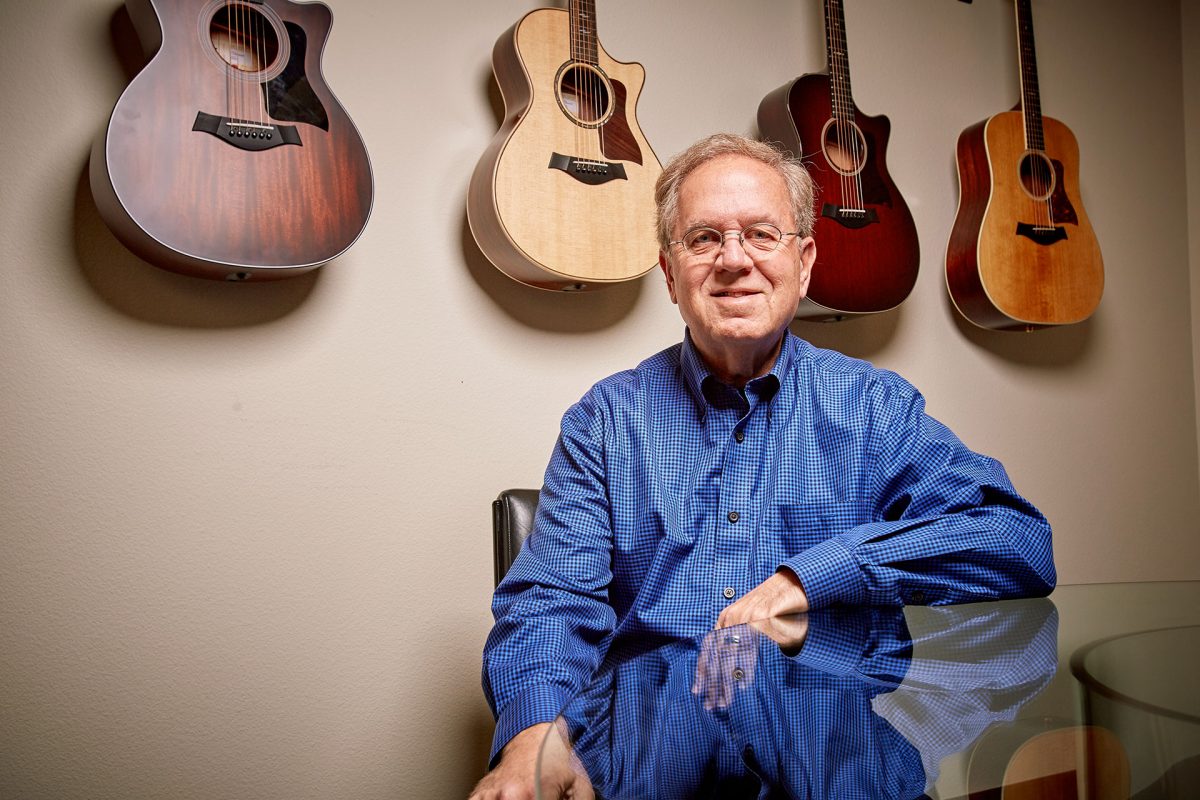
Q: You and Bob both forged the identity of Taylor Guitars in the face of daily adversity. You had your backs against the wall many times, especially in the company’s early days. How did those experiences prepare you and Bob — and now Andy Powers and other leaders within the company — to respond in situations like these?
A: They’ve given us a lot of confidence that we can get through anything. Even when we can’t see any light at the end of the tunnel. We’ve proven to ourselves that we’re resourceful. Even though it’s stressful, we know we’ll make a lot of gains and breakthroughs we otherwise wouldn’t have made, or we would have made much more slowly.
Q: What are you learning from this particular experience as a leader? How do you think Taylor Guitars will emerge from this crisis stronger as an organization?
A: I’ve been thrilled to see people step up throughout the company to do everything they can to keep the company moving forward. People are 100 percent engaged and committed to success. I think the organization is gelling more tightly. Our teamwork is the best it’s ever been, and we’re laying the groundwork for some of our most rewarding and successful years directly ahead.
Q: Despite the shock to the system the current scenario has created, it’s been fascinating to see how adaptive people have been. Whether it’s artists embracing new ways to engage people through social media platforms or retailers getting creative with the ways they conduct business, new ideas are born and some take root. What’s your take on what you’ve been seeing and experiencing? And what does it say about the power of music during a time like this?
A: You can’t sit back. There’s no guarantee of survival. It’s an incredibly disruptive situation we’ve been dealt, and we all must do everything within our power to right the ship and make it through to better days ahead. It’s been rewarding and reaffirming to witness newly the power and importance of music. Music isn’t a nice thing to have, it’s a necessity.
Q: From your perspective, as a company that has always placed a premium on the relationships developed with our employees, customers, retailers, vendors and other partners, why is supporting them especially important at a time like this?
A: The company does best, and we all do best, when we make decisions that benefit the broadest number and disadvantage the fewest. That speaks to our values of caring for others and weighing our actions so they have the broadest positive impact. That’s always important, but in difficult times especially, you want to make sure you’re pulling others up with you as much as you can.
Q: It’s been cool to see Bob and Andy working more closely together lately to find ways to design and build their way out of the current situation, and reacting to the new realities that consumers and retailers will face. Despite the hurdles to be overcome, both seem creatively energized. Do you similarly find yourself creatively stimulated as you think about Taylor’s strategies moving forward?
A: Absolutely. This situation really has compressed time, in that we’re fighting to make the most progress we can against an unknown duration of this disruptive event, and the unknown of how the world will change. Really digging in and leapfrogging the normal pace of operations is super invigorating.
